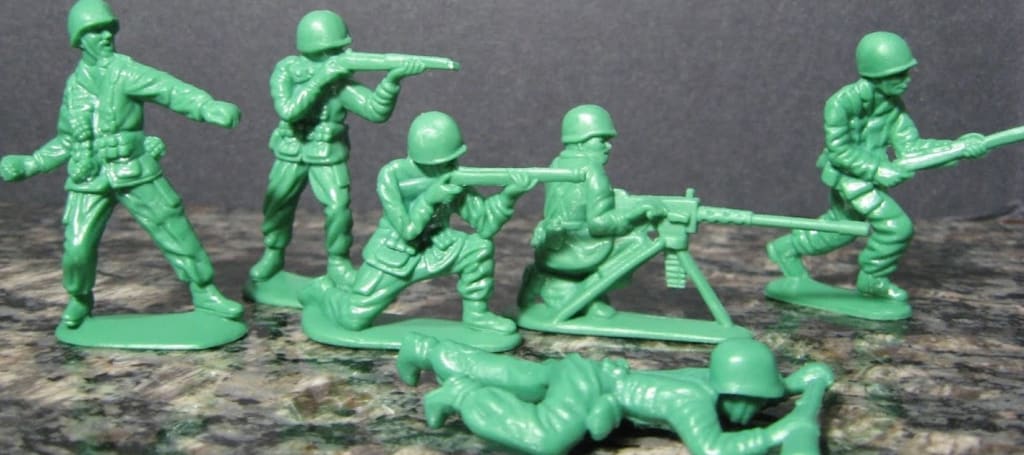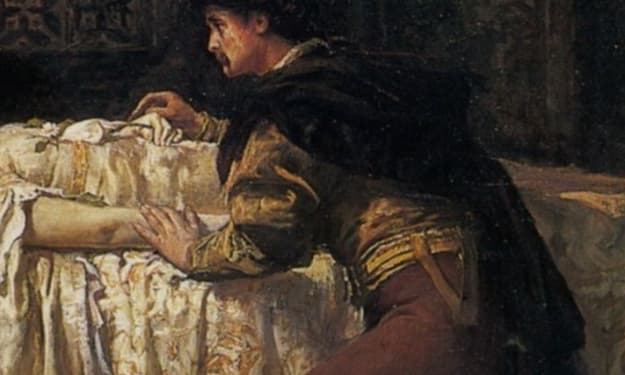Toy Soldiers
A short Story

Toy soldiers. Don’t you just love them.
When I was eight, I inherited an army. It was from our neighbour, Mrs Henson. She had been doing a clean out of her son Matthew’s room; he’d ran off to play soldier of sorts himself, and at only eighteen ended up paying the ultimate price; not so much as a ribbon or draped flag to show for it.
Before that I only knew Mrs Henson to be a smiling, gentle lady with a kind way. That was until the day her boy left home for the last time, carried out on the strained shoulders of a vengeful father and uncles. On that day something inside her broke, leaving her spirit irreparable and her heart as cold as the stone marking her son’s final rest.
One day, before I knew any better, I innocently asked, “Mrs Henson, how come you don’t smile anymore?”
My mother quickly hushed me with a gentle, yet clear tug of the arm as she shot Mrs Henson an apologetic look. I mean, she did smile and all, but it was kind of like the opposite of a clown when they look sad; you know, false, painted on for the benefit of others.
A few months later Mrs Henson came to the house and gave my mum some things that once belonged to Matthew, found in the attic. I guess it was her way of moving forward, letting go. She departed with a jumble of books that seemed too old for me; a collection of football stickers; an action man who seemed to have been through the wars himself, if his missing left arm and twisted right leg were anything to go by; and then there was the fat, bulging bag full of little plastic green and tan army men. Peering inside the bag, I was excited to find a treasure of activity. There were courageous riflemen, sly M60 gunners lying in wait, the occasional enthusiastic commander pointing the way forward, bazooka men, flame throwers, artillery, and of course, the much-coveted tanks.
Excited, I made straight for the garden with a plan to spread out my opposing armies in various combat scenarios in amongst the grass and plants. Dad would be home soon and I couldn’t wait to show him my precious cache.
The first task was to separate the Greens from the Tans. There were ten or so Grey soldiers, too; these would be my elite commandos. Twigs became charred, dismembered trees, pebbles suddenly transformed into large boulders and the loose soil all around became the mortar-scarred battlefield.
Carefully, I laid out all my men with movie-scene simplicity; using the landscape to either help or hinder each soldier. Two Tanned riflemen escorted a flamethrower towards some fallen trees; they seemed oblivious to the Green machine-gunner sprawled out behind a mound of dirt, waiting patiently for them to get close enough to take his explosive shot. Some Green riflemen marched behind their only tank on the battlefield. They were close to a large boulder where two Tanned bazooka men waited in ambush.
All around lay similar scenes of Green soldiers about to engage Tanned and vice versa. The Green army had a tank and three mortar guns but the Tanned army had more men and were more strategically advantaged. It was decided then; the grey commandoes would go with the Green army. I named this much smalller platoon, ‘the howling elites’.
Like a general who would never see direct combat, I surveyed the now readied battlefield, taking in the dangers with a detached interest that only a lack of personal danger could bring. The scene unfolding before my feet reminded me of the time my dad took me to the war museum the previous summer. There were lots of weapons and pictures and dressed-up dummies in glass casings and scenes of soldiers fighting on uneven fields and in muddy trenches, dropping bombs on each other and having dogfights in the sky, and for the most part, everyone seemed sad and miserable; it all lacked the perky can-do attitude I was accustomed to from most Hollywood movies.
Not for the first time, my dad told me he fought in a war, but not like these big ones. He called it a guerrilla war, which I thought sounded funny and was reminded of Planet of the apes; immediately I search my dads pugilist features for a hint of Charlton Heston, but this hard man is chiseled from a different kind of rock. All the same, I listened carefully as he rarely spoke about his past. He told me when he was younger people fought with each other to see who would own our country. Like the muddy soldiers in their trenches, too many fought for very little say in return. It all sounded sad and pointless. Then with the innocent lightness of a naïve child I asked him if he had ever killed anyone and his face fell grim. Had the question been a landmine we would both be dead. It was enough to silence him, speaking no more on the matter.
Passing through the centuries of swords, arrows, guns, canons and the evolution of death, we came to some old black and white photos depicting the end of World War II in Paris; one in particular caught my attention. It was of a young woman crying; she was cradled in her mother’s arms and her underwear was down around her ankles. Around her men and women stood smiling, sharing a laugh together. I Was too young, too sheltered to comprehend the stark contrast of the photo; I stared at the frightened mother comforting her raped and beaten daughter in the middle of the street, grossly conflicted with the laughing Parisians who seemed almost proud of the spectacle they caused.
My dad was quick to steer us away from the image before realising the damage was done; the horror of the situation had been burned into my mind.
Thoughtful for a moment, he began to speak slowly, carefully. “She served the enemy to survive the war, and probably feed her family. So, her own people punished her for it.”
“But why,” I asked, “if she had to do it.”
My dad allowed a long sigh and took on a sad expression as though he had no answer, at least, no definitive one.
“People are cruel,” I offered, staring back at the weeping mother.
“That’s true,” dad said. “But we can just as easily be kind. Unfortunately, war tends to bring out the worst in us.”
“Were they cruel when you fought?” I asked.
Though beside me, dad seemed to disappear across another world and his expression made me feel sad. “No crueller than anywhere else, son” he said. “But I- we, did our share of hurt.”
We moved on and though I enjoyed seeing the tanks and planes and other great machines of war I soon grew tired of looking at so many photos and images of sad people, so my dad added me to the weight of his broad shoulders. Being so close to his face I took in the gentle wafts of old spice emanating from him, battling with the scent of alcohol that would only grow stronger as the months and years passed by.
After the museum we got fish and chips and found a park bench to eat wearily, as hungry pigeons began to surround us in a pincer movement. We ate in silence and whilst I can’t say there was a noticeable change in dad’s mood, it was certainly there, waiting in the trenches for a surprise attack.
With a steady hand I place a Green flame-thrower at a boulder’s edge as two Tanned riflemen advanced toward him, oblivious of the blazing doom that awaited them. Three of my best grey ‘howling elites’ made to flank the Tanned army’s command base, a grey box-like tent carelessly unprotected at the rear. Tan mortars prepared to fire on an overturned jeep that hides a sniper. Most of the Greens spread out across the battlefield, readying to advance on a seemingly undermanned resistance, but the landscape is rocky and conceals many deadly surprises by way of heavy gunners and grenadiers. Dad will like this tactic. I remember one time when he had been drinking with a friend, he reminisced having surprise-attacked some soldiers this same way. His words were slurred and his eyes glazed and wandering. I couldn’t tell if he was bitter or sad when describing how the young soldier had fallen with a yelp for his mommy, and his blood poured onto the street amongst the discarded bubble-gum and worn hopscotch chalk.
Just then, my mum walked in and quickly scolded him and told me not to listen to such tall tales. My dad, as though only realising I was there, turned away, flushed with shame. But his face was reminiscent of the trench soldiers forever entombed in the cold, stony walls of the War Museum.
Later that night, I lay in bed listening as my parents argued at first, but then dad soon succumbed to remorseful sobs in a penitent confession that my mum had clearly comforted him through many times before.
“A strong, supportive woman is a far better absolution than any priest ever could be,” my father advised me many years later; advice that always brought me back to my mums soft, soothing hushes that night.
Almost finished now with only the Tan tanks to roll in, the men keeping close behind for cover. Things look bleak for the Green army, but they do still have the element of surprise on their side in the howling elites, which should count for something. Green bazooka-men advanced bravely on the enemy tanks. Behind every rock and tree soldiers lay in wait. Everything was ready. The scene was set.
Just wait until dad sees this. He’ll be so proud. And just as the Grey commandos were about to flank their enemy, so my dad flanked me. I jumped eagerly to my feet and pointed with excitement to the battle below hoping my dad would proudly stop and examine the war. Instead, I met him on his last few staggers toward the door as he swept me aside effortlessly with a dismissive arm and an incoherent remark. Feeling as though a bullet caught my chest, I dropped with a breathless thud. Both sides now found a new common enemy as I created carnage, turning the battlefield into a mess of dead plastic and dirt.
Wounded, I sat up and surveyed the damage. Not a man was left standing; they were flattened to the ground as yet another Little Boy destroyed so many lives.
Feeling like a trench soldier, I restrain my tears and scrape away the plastic dead.
Toy soldiers. Who cares about silly games, anyway.





Comments
There are no comments for this story
Be the first to respond and start the conversation.